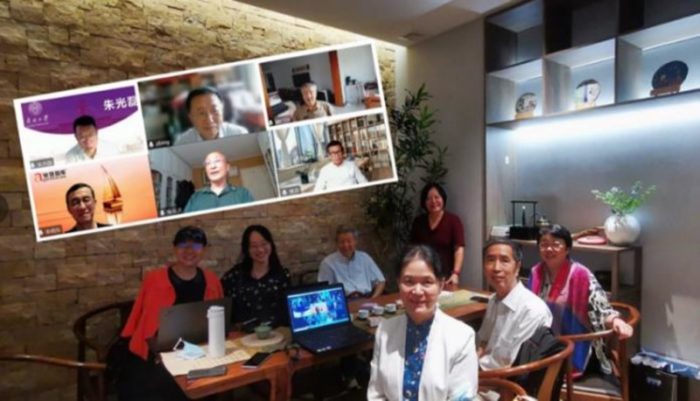
Global China Academy’s President Professor Xiangqun Chang’s Academic and Professional Activities in China After COVID-19, 02/09-12/11/2022
Introduction
On her trip to accompany her mother returning to China and to help her settle there, Professor Xiangqun Chang visited China from early September to mid-November 2022. During this period, she participated in a series of meetings and activities with related parties there. The description of the activities below aims to enable our global colleagues to meet some of our Chinese colleagues and contacts in China for the purpose of sharing information and networking.
Timeline
On the 17th September, a meeting was held in the Tsinghua Science and Technology Building at Tsinghua University, Beijing. It was organized by GCA Trustee Dr Yuan Cheng (front right), Country Manager of Greater China, Russell Reynolds Associates (UK), and Professor LAN Chun of Beijing Foreign Studies University, Executive Editor of the Journal of Chinese for Social Science (JCSS, front left). All the GCA Founding Fellows and Life Fellows participated in the meeting online and offline.
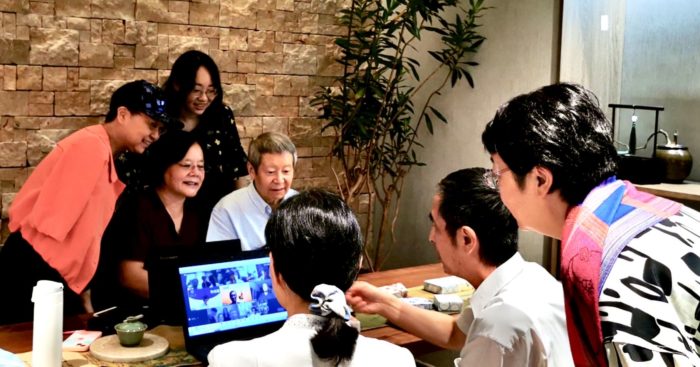
The above photo shows participants in person or online. In-person participants included Professor LI Qiang (rear 2nd right), Professor XIE Lizhong (front 2nd right) and Professor Xiangqun Chang (rear right). Online participants (inset) included Professor BING Zheng (top centre), Professor ZHU Guanglei (top left), Professor GU Yueguo (top right), Professor ZHANG Xiaodong (bottom left), Professor ZHANG Letian (bottom centre), former Dean of School of Social Development at Fudan University, former Chinese President of GGPN Global and Global China Institute (GCA’s predecessors) and Honorary Editor of JCACSS (Chinese edition); Dr Qing Cao (bottom right). Many important issues were discussed in the meeting.
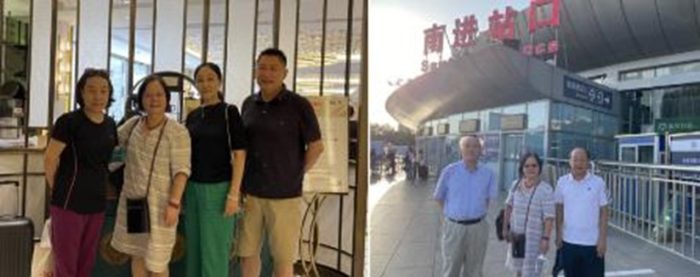
Left: In morning of the 18th September, Professor Chang met Ms ZHANG Haiou (left), former Editor-in-chief of the New World Press, one of GCP’s Chinese partners. The topic of metaverse was discussed.
Right: In the afternoon, Professor Chang had a productive meeting with Professor CHEN Guangjin (left), Director of Institute of Sociology, and Professor FANG Ning (right), Deputy Director of Institute of Political Science, Chinese Academy of Social Sciences (CASS).

On 19th September, Professor Chang visited the headquarters of Learning without Borders (LwB, also known as UVIC) in Changsha City, Hunan Province. UVIC funded the first three Global China Dialogues and has been one of the most faithful supporters of GCDs. In the meeting, Philip Hao (3rd left and far right in the above photos), CEO of the LwB and UVIC, and his colleagues discussed issues for further collaboration with GCA.

On 21st September, three meetings were held at Kingswell Hotel at Tongji University.
Left: The first meeting was with Professor WANG Xin (right) and Dr DING Fan (left). Professor Wang interviewed Professor Chang in London in 2018 when she was visiting fellow at University of Westminster and published the interviews in both English and Chinese. Wang is Head of Department of Communication, School of Arts and Media, Tongji University.
Centre: Meeting with Ms ZHANG Yanli (2nd left), General Secretary of the School, Professor WANG Jianmin (right), Deputy Dean of the School, and Dr DING Fan (left), Head of the Academic Development Division of the School. Ms Zhang showed some photos of the International Conference on Comparative Media Studies, jointly organized by the School and CCPN Global, on the occasion of the Centenary of Tongji University in 2017, when Professor Chang delivered greetings at the Opening session. She accepted the School’s invitation to give a speech at an international conference in person in mid-October.
Right: Meeting with Professor LI Linxue (3rd right), Dean of the School, Dr WANG Zhili (left) and others. Three meetings covered a total of 10 topics, including collaborations in organizing events, research projects, building a corpus for specific purposes and publications.
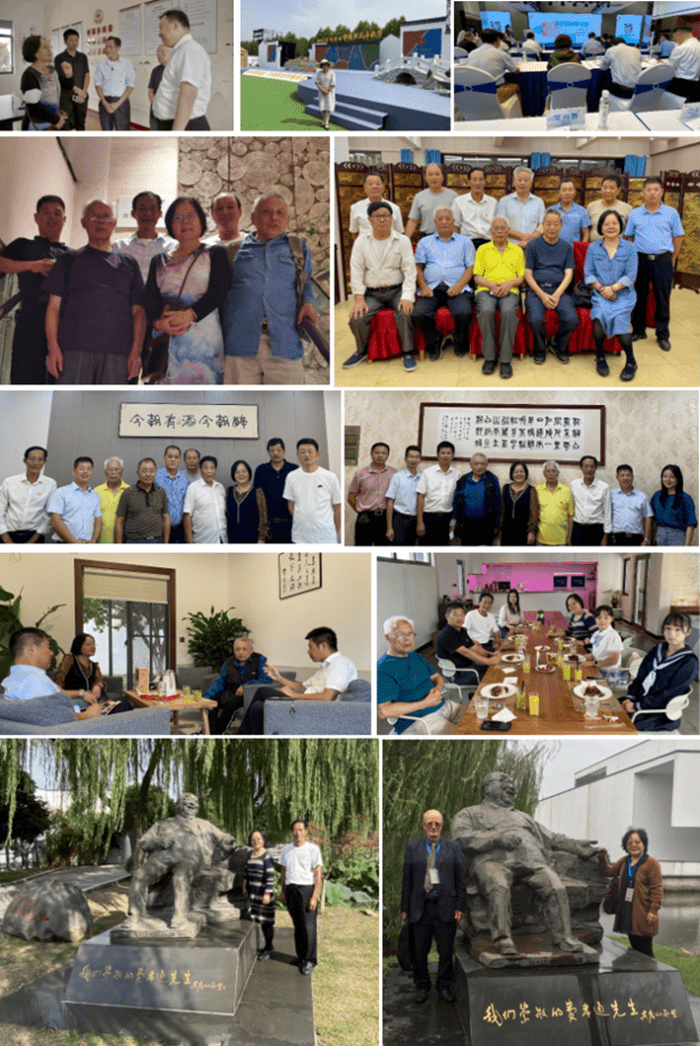
In the evening of 21st September, Professor Chang arrived in Kaixiangong Village, Qidu Township, Wujiang County, Suzhou City. The renowned Chinese anthropologist and sociologist Fei Xiaotong conducted his fieldwork in the village in 1936, which resulted in his book Peasant Life in China (1938). Based on her thorough fieldwork in the same village, Professor Chang published Guanxi or Li Shang Wanglai ?: Reciprocity, Social Support Networks, Social Creativity in a Chinese Village (in English and Chinese, 2010 and 2011). She has been developping the concept of ‘recipropriety’ and testing it in and outside China. Photos are numbered 1–10 from top to bottom, left to right. Photo 1: Profesor Chang talked to Mr CAI Jianzhong, the General Sectotaery of Qidu Township. Photo 2: Enjoying the Chinese Farmers’ Harvest Festival (CFHF) in the village, the first such festival created by the state. Photo 3: Participating in a Rural Development Forum during the CFHF. Photo 4: Meeting Professor LIU Haoxing, School of Social Development, Fudan University (front left), Dr HUI Haiming, Fomer Director of Policy Studies of Suzhou City (front right), ZHOU Yuguan (rear right), a non-party member who was officially designated ‘General Secretary’ of the village; YAO Fukun (rear centre), Head of both Fei Xiaotong Museum and the village’s Folk Museum and related affairs; XU Guoqi (rear left), former Deputy General Secretary of the village, currently a member of a Special Working Group (zhuanban 专班) that is in charge of major development projects of the village. Photo 5: Professor Liu (front centre) arranged a meeting with former heads of the village and some village groups. Photo 6: SHEN Zhirong (rear right, in black), former General Secretary of the village, who helped Professor Chang conduct her first fieldwork in the village in 1996. Photo 7: An official meeting arranged by the current General Secretary XIA Zhiyao (3rd left). Photo 8: A discussion about the ‘Special Working Group’ in its office in the village. Photo 9: Dining in Jiangchun Club (江村西餐厅), a Western-style canteen in the village. Photo 10: With YAO Fukun by the Fei Xiaotong statue. Photo 11: With Professor Stephan Feuchtwang, LSE, by Fei’s statue in 2016, when they participated in the international conference to mark the 80th anniversary of Fei Xiaotong’s fieldwork in the village.
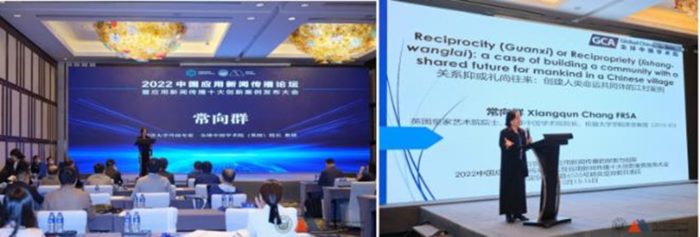
Based on the above fieldwork, on 15th October, Professor Chang delivered a speech entitled ‘Reciprocity (Guanxi) or recipropriety (lishang-wanglai): a case of building a community with a shared future for mankind in a Chinese village’, at the international conference ‘China and the World: Exploration and Innovation of Applied Journalism and Media Studies’, Tongji University, Shanghai.

On 16th–17th October, Professor Chang visited Suzhou City, the ‘Heaven City’ in China. She had an enjoyable visit to a Cantonese tea house, Chaoren Fang, which mixed different styles of Chinese calligraphy including ‘kung fu calligraphy’, a kind of performative art, accompanied by Dr HUI Haiming (right). The owner, Mr WANG Kai (2nd right), believed this is a good way to communicate with people from different cultural backgrounds. They also walked in underdeveloped original residential places in Ming Dynasty in Suzhou City. One wonders if Heaven City can get any better!

On 18th–21st October, Professor Chang visited Wuxi City, a historic city over 3,200 years old, with its Grand Canal. A UNESCO World Heritage site, it now has the highest per capita GDP in China.
The visit was arranged by Mr DU Yichao (3rd right in green, left photo, with his colleagues), PhD candidate in anthropology at University College London. He is also Director of Wuxi New Culture Research Institute.
Centre: Officials and experts from Liangxi District accompanied Professor Chang on visits to places of interest.
Right: For COVID tests and to obtain different codes, Professor Chang’s UK passport was checked everywhere throughout her visit to China. This one was in Wuxi, which was designated a zero-risk city at that time.
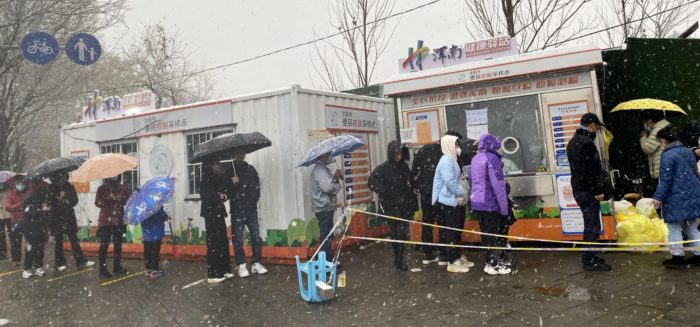
The photo on the left was taken on 12th November 2022 in Shenyang City, while Professor Chang was queueing for a COVID test or nucleic acid testing (核酸检测) on a snowy day. The term ‘doing nucleic acid tests’ (做核酸) has become a catchphrase in people’s daily lives, and the action of ‘doing nucleic acid tests’ has become a way of life in their everyday routines. The nucleic acid testing sites were well-built and well-located. Even a small site was easier to find than a well-known residential area (小区) on a digital map.
Professor Chang’s experiences and skills in learning and using different kinds of health codes became a special memory: from international health codes to provincial, regional, or city-specific ones, and from English to Chinese versions. For non-Chinese passport holders entering Beijing, the English version of the health code (Health Kit) is required. There were different names for health codes, such as Liaoshitong (辽事通) for Liaoning Province, Shengshitong (盛事通) for Shenyang City (Shengjing 盛京 was the capital of the Manchu state during the Qing Dynasty period, which later became the city of Shenyang), Suishenma (随申码) for Shanghai City (Shanghai known as ‘Hu沪,’ also referred to as ‘Shen 申’), Sukangma (苏康码) for Jiangsu Province, and Xikangma (锡康码) for Wuxi City. These codes were necessary for entry at airports and stations. Within any given location, whether it be a hospital, office, shop, restaurant, or any place of interest, the ‘Changsuoma’ (场所码) had to be presented. All the above codes must be dynamic and cannot be photos or screenshots of codes that were prepared earlier. The diversity and ingenuity of these health codes reflect the Chinese people’s adaptive strategies in dealing with COVID-19.
The above tests and codes have ensured that both the virus and people are tightly controlled. Everyone seems to have adapted to this kind of lifestyle. It is truly remarkable how the COVID-19 situation changed dramatically two weeks after she left China. ‘Understanding China and the World,’ one of GCP’s book series, is clearly important and will continue to be so.
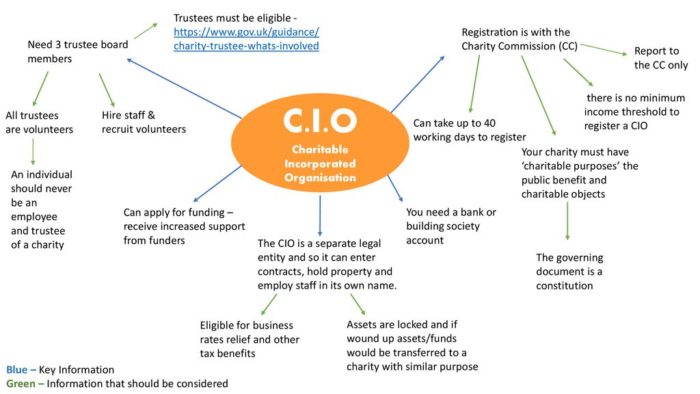
GCA became Charitable Incorporated Organisation (CIO)
The Charitable Incorporated Organisation (CIO) is a new legal form for a charity. It has been created in response to requests from the charitable sector. It is a new incorporated form of charity which is not a limited company or subject to company regulation.
CIOs have been designed specifically for charitable groups, allowing them to register just once with the Charity Commission as an incorporated form of charity which is not a company. This cuts out the need to register with and report to Companies House.
Reduced administrative burden is proposed as just one of the benefits of becoming a CIO. In addition to this, the CIO would have its own legal personaltiy and so can enter into contracts in its own right rather than in the name of individual trustees. Trustees will also have limited liability.
CIO members still have key rights in law and under the Constitution and trustees are still responsible for managing the organisation (note that trustees for CIOs will only be trustees, they will not have the dual role of Company Director).
Click HERE to download GCA Constitution of Charitable Incorporated Organisation.
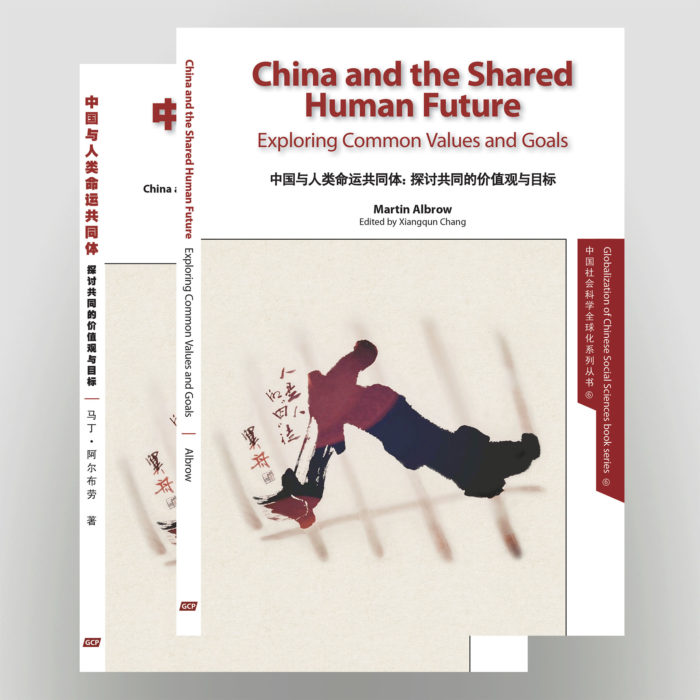
Launch a new book at the London Book Fair 2022
Graphic report: the Book Launch Ceremony and Forum on China and the Shared Common Future: Exploring Common Values and Goals, by Martin Albrow, edited by Xiangqun Chang
On April 6,the Book Launch Ceremony and Forum on China and the Shared Common Future: Exploring Common Values and Goals (English edition, hardback and paperback) was held during the London Book Fair in 2022. The book is written by Professor Martin Albrow FAcSS and edited by Professor Xiangqun Chang FRSA. The event is hosted by the Chinese Academy of Social Sciences (ASS) and China Publishing Group Co.,Ltd., organized by the Institute of European Studies , CASS, and the China National Publications Import & Export (Group) Co., Ltd., and co-organized by Global Century Press, UK, and New World Press, CIPG, China.
Click HERE to download the report.
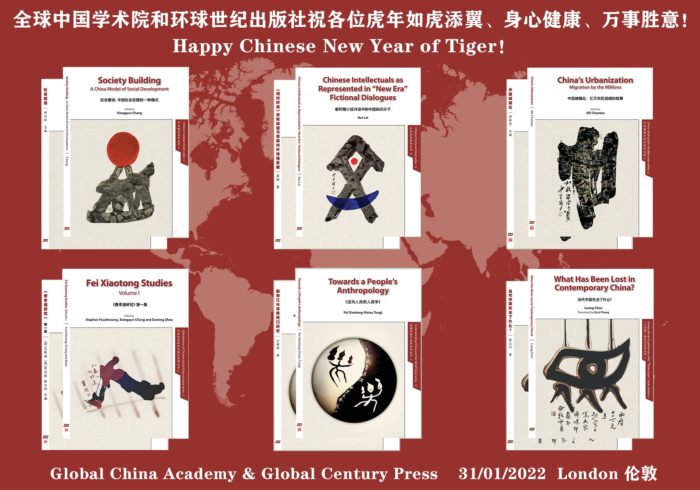
Chinese New Year Greeting (2022)
Dear colleagues and friends,
As the Year of the Tiger 2022 starts ‘mooing,’ we are delighted to extend our best wishes with this greeting card, featuring our new covers for the book series. Our publishing subsidiary, Global Century Press (GCP), is proud to offer a unique feature: a dual-language service from global, comparative, and transcultural perspectives. (Two additional book series were added in 2023; see more details).
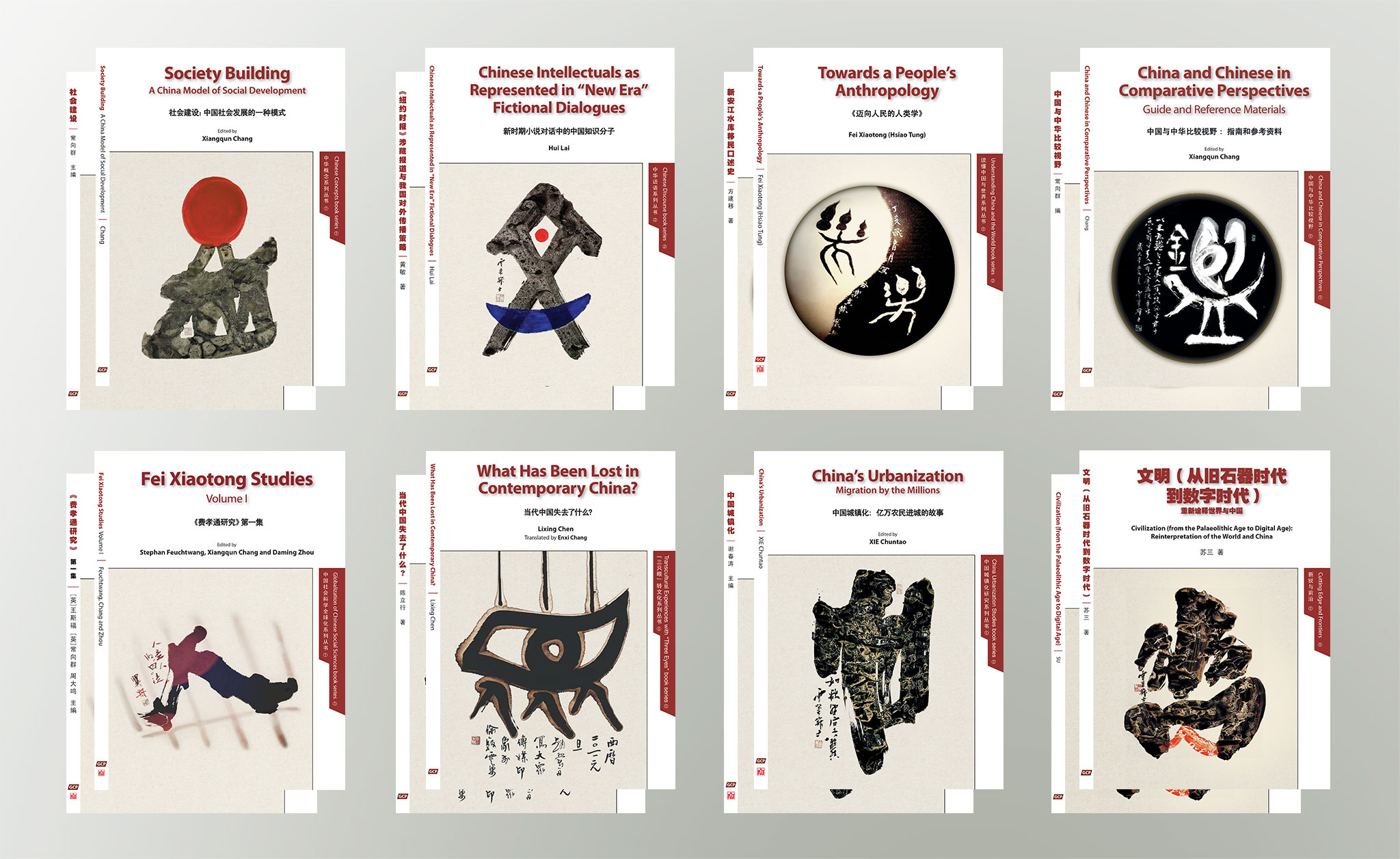
The covers of all the book series feature ‘calligraphy paintings’ (书画) selected from the transcultural works of British–Chinese calligrapher and artist Yizhou Zhao (赵翼舟), one of the finest contemporary Chinese calligraphers in the world. Each image is based on a Chinese character or phrase that to a certain extent reflects the theme of each series. For example, the Chinese character 旦 (dawn) is used for the ‘Chinese Concepts’ series; 文明 (civilization) for the ‘Chinese Discourse’ series; 乐 (happiness) for the ‘Understanding China and the World’ series; 鑑 (鉴 reflect, scrutinize, comparison) for ‘China and Chinese in Comparative Perspectives’ series; 人 (people or human beings) for the ‘Globalization of Chinese Social Sciences’ series; 众 (the masses or crowd) for the ‘Transcultural Experiences with “Three Eyes”’ series; 心 (heart) for the ‘China Urbanization Studies’ series; and 幽人 (people who are uniquely independent and creative because they live in seclusion) for the ‘Cutting Edge and Frontiers’ series. Some of the characters are directly used as the title of the image, and some of them offer more elaborate and specific meanings, e.g. ‘Man is man’s prisoner’ (《人是人的囚徒》) and ‘Mass media’ (《大众与传媒》). In the case of ‘Everybody can enjoy his own happiness’ (《各乐其乐》), the image represents yin and yang, the typical Chinese way of thinking. The artist’s rich process synthesizes the materials (including acrylic on watercolour paper, ink on rice paper, and oils) and techniques found in China and the West, and draws on the histories of both spheres to offer a dialogue between them. With deep aesthetic and philosophical underpinnings, informed by his many transcultural experiences between Chinese and Western cultures, Zhao’s work strikes a balance between tradition and innovation and illustrates the aims of both GCA and GCP.
Our charity year runs from April 1st to March 31st, different from the calendar year of January 1st to December 31st. Our annual reports for 2020-2021 and 2021-22 cover these periods. We are very pleased to share our past year’s achievements and insights through these reports. It was a year of growth, overcoming challenges, and reaching milestones, thanks to our team’s effort and commitment. We launched new initiatives, broadened our impact, and contributed significantly to our community. Looking forward, we aim to build on this with innovative strategies and continued excellence. Here’s to a prosperous Year of the Tiger, wishing everyone health, happiness, and success. We hope for your continued support, interest, and participation in our activities.

